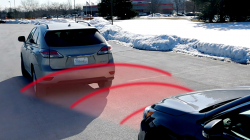Is Hyundai Falling Behind in AEB Technology?

Hyundai, along with 19 other manufacturers, has agreed to a voluntary program to equip all new passenger vehicles with automated emergency braking (AEB) technology by September 1, 2020. AEB was found to reduce rear-end crashes by 39% during research by the Insurance Institute for Highway Safety.
Automatic emergency braking uses a combination of radar, lidar (reflected laser light) and cameras for a forward collision warning system that gives a driver audio or visual warnings that a forward collision is near.
Hyundai, however, has a long way to go to live up to their promise. In reviewing the 2017 model year lineup, only 9% of Hyundai’s passenger vehicles have AEB as standard equipment. Compare that to Honda (30%), Toyota (56%), and Volvo (68%).
Although the government talks in terms of automakers making progress, auto safety advocates say leaving important lifesaving technology to "voluntary agreements" is proof the automakers control NHTSA, the agency tasked with protecting the safety of vehicles and occupants.
Three consumer advocacy organizations have petitioned NHTSA to mandate and enforce the AEB implementation, rather than leaving it up to the automakers to decide when and how to implement the technology.
More information on carcomplaints.com